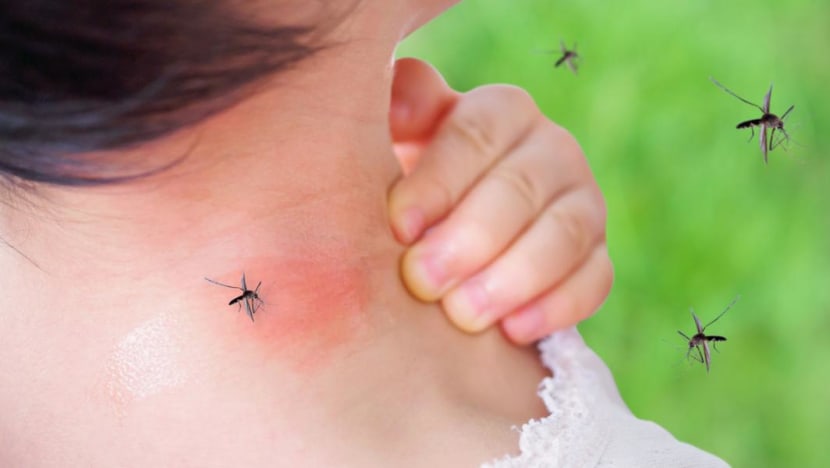FAQ: Can you get dengue a second time? What you need to know about the disease amid rapidly rising cases

A girl being bitten by a mosquito. (Photo illustration: iStock)
SINGAPORE: Singapore is in the middle of a dengue outbreak with numbers that rose even before June, when the dengue peak season typically begins.
A check on the National Environment Agency (NEA) website on Wednesday (Jul 6) shows that the number of cases so far this year has exceeded 18,200.
This is more than triple the 5,258 cases in the whole of 2021. The yearly record is 35,315 cases in 2020.
CNA spoke to Dr Chia Po Ying, a consultant at the National Centre for Infectious Diseases (NCID), to find out more about the disease.
Q: Why should I take dengue seriously?
There is a misconception that dengue is "just some fever and is harmless", Dr Chia said.
While some people do get asymptomatic dengue, this is not true for many people.
"Besides the fact that dengue can kill, the other name for dengue is 'break bone fever' and it can be as terrible as it sounds," she said.
Dengue can cause debilitating symptoms such as high fever, severe muscle aches and joint pains.
It can also result in complications such as organ failure and death. This means that there is an urgent need to address dengue now, she said.
Q: How dangerous is dengue?
Another misconception is that dengue only kills the very young and the old.
"This is patently untrue," Dr Chia said.
"We have had deaths in young adults who were presented late to healthcare."
People may feel they only have a fever which would go away by itself, and not seek treatment early enough, Dr Chia said.
People may also wrongly think that they can get dengue only once.
Given that there are four dengue serotypes, a person has four chances of getting dengue, Dr Chia said.
She explained that two of the strains were the most commonly seen strains in Singapore in previous years. However, in the second half of 2021, a different strain accounted for more than half of the dengue cases sampled in Singapore. It remains the dominant serotype this year, she added.
"Infection with one serotype will only result in lifelong protection against that particular serotype," she said.
Among the identified risk factors for severe dengue is having a second episode of dengue infection. Others include co-morbidities such as hypertension and diabetes.
Q: What symptoms should I look out for?
Symptoms suggestive of dengue include the sudden onset of fever for two to seven days, severe headache with pain behind the eye, joint and muscle pain, skin rashes, nausea and vomiting, bleeding from the nose or gums and easy bruising of the skin, NEA says on its website.
Those with such symptoms should see a medical practitioner early for diagnosis and treatment.
Dr Chia said the best-case scenario is dengue fever by itself without warning signs or even asymptomatic dengue.
The worst-case scenario would be severe dengue, which is characterised by severe bleeding and severe damage to organs like the heart, brain or liver.
Other warning signs for dengue include giddiness when standing up or sitting up, decreased urine output and heavier menses for women, she added.
“It is also important to know around the time when fever stops or is stopping. That can be the time when warning signs occur, and deterioration may occur,” she said.
Older people may have fewer aches and pains, and may have only tiredness with or without a decrease in appetite. This makes it more challenging to diagnose dengue early and to manage it well among this age group, Dr Chia said.
Depending on severity, recovery can range from a few days to a few weeks. However, if there is severe dengue, recovery can take months, she said.
Q: How is dengue confirmed and treated?
Dengue can only be confirmed by a blood test. At the clinic, after confirmation of dengue, specific advice will be given on warning signs and what to watch out for, Dr Chia said.
If there is a history of diabetes or high blood pressure, long-term medications may need to be adjusted with ongoing dengue fever. Follow-up for regular blood tests in the acute illness phase would also be required.
The treatment of dengue is currently mainly supportive and may consist of symptomatic treatment as well as intravenous fluids when necessary, she said.
Addressing the use of carica papaya leaf extract, a common non-medical remedy used here, she said this has been studied in the management of low platelet count in dengue.
While these studies show that the extract may accelerate the recovery of platelets, these studies are mostly of "low to moderate quality".
“Low platelet count is also just one presentation of the underlying disease process in severe dengue and targeting platelet recovery on its own may not improve the outcomes of severe dengue,” she said.
Currently, there is no evidence that such papaya leaf extract improves the overall clinical outcomes of severe dengue, she added.
Q: Can dengue be prevented?
A new vaccine against dengue is on the horizon, but more fundamentally, Dr Chia pointed to good practices recommended by NEA for protection against the disease.
These are:
- Break up hardened soil
- Lift and empty flowerpot plates
- Overturn pails and wipe their rims
- Change water in vases
- Keep roof gutters clear and place insecticide that kills mosquito larvae
NEA advised members of the public to use mosquito repellent regularly to protect themselves from getting mosquito bites, especially if they are living in dengue cluster areas.
Repellents containing DEET, picaridin or IR3535 as the active ingredient are the most effective in repelling mosquitoes.
NEA also urged residents, especially those living in dengue cluster areas, to take precautions such as wearing long sleeves and pants.

















